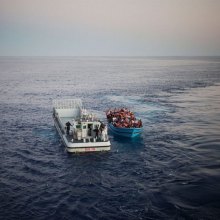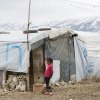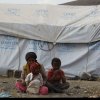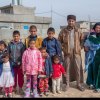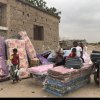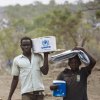
Refugees along Mediterranean crossing may face 'horrendous abuses' at the hands of...
Refugees along Mediterranean crossing may face...
“Saving lives must be the top priority for all and, in light of the recent increase in arrivals, I urge further efforts to rescue people along this dangerous route,” said UN High Commissioner for Refugees Filippo Grandi in a press statement after more than 6,000 people crossed the Mediterranean to reach Italy just over the past weekend. Some 75 people have died since last Thursday.
The Central Mediterranean – with smugglers trafficking people from the shores of Libya to Italy – has proven to be particularly deadly. Out on the open sea, approximately 1,150 people have either disappeared or lost their lives in 2017.
In a response to the recent stories reported to his teams by survivors, Mr. Grandi said that he is “profoundly shocked by the violence used by some smugglers,” pointing specifically to the recent merciless killing of young man a few days ago.
As the “Central Mediterranean route continues to be particularly dangerous this year, also for 2016 the UN recorded more deaths at sea than ever before.
The main cause of shipwrecks, according to the Office of the High Commissioner (UNHCR), are the increasing numbers of passengers on board vessels used by traffickers, the worsening quality of vessels and the increasing use of rubber boats instead of wooden ones.
With the total numbers of death rising, the total number of registered arrivals for 2017 – the number of people that made it safely to the registration centres – has exceeded 43,000, according to aggregated numbers of UNHCR. They alerted parties earlier this year that in 2016, some 181,436 arrived in Italy by sea.
Stressthat people smuggling must be stopped, the UNHCR chief said: “There is an urgent need to address the root causes which lead people to move, as well as to offer credible alternatives to these dangerous crossings for people in need of international protection, including accessible and safe ways to reach Europe such as family reunification, relocation and resettlement.”
He called on European and other donor countries to redouble their efforts to solve conflicts, especially in Africa, and to use development resources much more strategically in order to reduce poverty, mitigate the effects of climate change, and to support countries hosting large numbers of refugees, as well as transit countries.
A recent report from the UN World Food Programme (WFP) entitled At the Root of Exodus: Food security, conflict and international migration, spotlighted the complex link between food insecurity and migration – where increase in one forces the other to rise and then spirals back to push the former even higher.
 Reload
Reload